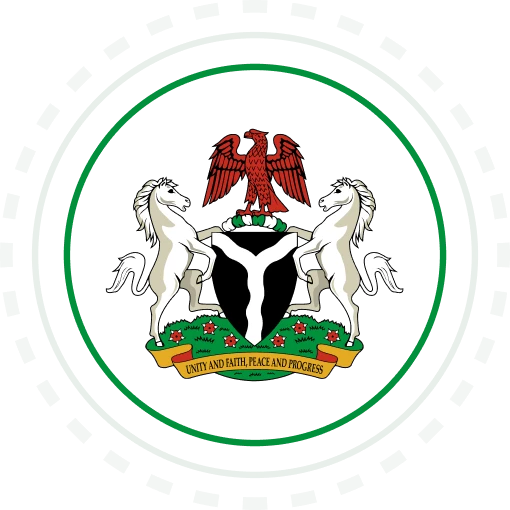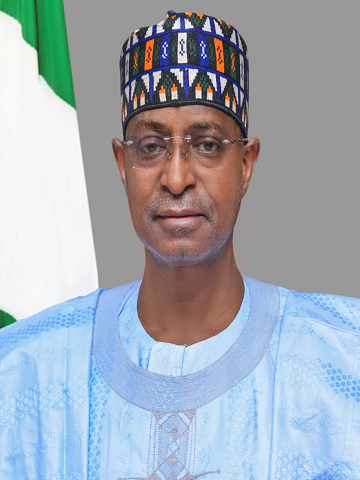
About the Ministry
The Federal Ministry of Livestock Development (FMLD) was established on July 9, 2024, by President Bola Ahmed Tinubu to transform Nigeria’s livestock sector into a sustainable and globally competitive industry. With a mandate to enhance livestock productivity, ensure food security, and drive economic growth, the Ministry is committed to addressing key challenges such as poor infrastructure and conflicts between farmers and herders. FMLD is structured into 17 departments, focusing on areas like livestock breeding, ranch development, pest control, and veterinary public health. Through strategic policies, research, and private-sector engagement, the Ministry aims to modernize livestock farming, create jobs, and boost Nigeria’s economy.
Our Mandate
According to a circular issued by the Secretary to the Government of the Federation (SGF), Sen. George Akume, CON, on September 12, 2024, with Ref. No. SGF/OP//S3/X11/218, the Ministry is mandated to “develop the policies and programmes needed to transform the livestock sector into a vibrant, sustainable, as well as globally competitive industry, ensuring food security, economic growth, improved livelihoods for farmers, and maintenance of social harmony.”
Our Vision
To build a resilient, sustainable, and inclusive livestock sector that drives economic growth, ensures food security, and improves livelihoods.
Our Mission
To implement innovative, inclusive, and sustainable policies, programmes, and projects that address the livestock sector’s challenges while fostering economic empowerment and environmental sustainability.
Our Structure
The Federal Ministry of Livestock Development is responsible for formulating and implementing policies to enhance livestock productivity, sustainability, and economic growth. The Ministry operates through 13 specialized departments, including seven (7) technical departments and six (6) common services departments, alongside a Special Duties Office, three (3) units, and seven (7) parastatals/agencies.
- Ruminants and Monogastric Department: The Department functions in the formation and implementation of policy that enhances the productivity and sustainability of dairy, beef, sheep, cattle, goats, pig, poultry, and other micro livestock sectors. It focuses on improving breeding, managing, practicing, processing, and marketing livestock products for economic growth.
- Ranch and Pastoral Resources Development: The Department formulates and implements policies for the development and sustainable management of grazing reserves, ranches, and stock routes. It also develops strategies to promote efficient land use within grazing reserves, improving livestock productivity and reducing conflicts between farmers and pastoralists.
- Pest Control Services: This Department formulates and implements policies for preventing and controlling transboundary pests and vectors of economic and public health importance. It is also responsible for sensitization, advocacy, and monitoring of pesticides used in livestock production.
- Quality Assurance & Certification: The Department initiates policy direction on safety guidelines for livestock products to protect animal and public health. It also issues International Veterinary Certificates (export and import permits) in compliance with the World Organization for Animal Health (WOAH).
- Veterinary Public Health and Epidemiology: This Department formulates policies and regulations on veterinary public health, ensuring good hygienic animal processing practices and safe delivery of animal products to consumers. It aims to protect public health from animal-borne diseases.
- Livestock Extension & Business Development: This Department develops policies and strategies to promote livestock extension services and business development for farmers, contributing to national food security and economic growth.
- Human Resources Management: Responsible for providing administrative guidelines to maximize productivity by optimizing employee effectiveness. It handles recruitment, training, staff performance evaluation, workplace culture, dispute resolution, and wellness programs.
- Planning, Research & Statistics: This Department oversees corporate and strategic planning, research activities, and statistical data collection. It supports livestock sector development through research on new technologies and breeding processes.
- Finance & Accounts: Responsible for financial planning, budgeting, and fund management. It ensures financial stability, transparency, and fraud prevention while supporting management in financial decision-making.
- General Services: Manages the Ministry’s facilities, transportation, logistics, and workplace safety, ensuring smooth operational services.
- Procurement: Oversees negotiation, purchasing, and stock management of goods and services. It ensures quality, cost efficiency, and adherence to legal and ethical procurement standards.
- Special Duties Office: Handles urgent issues, unforeseen situations, and strategic tasks requiring special attention. It also manages special projects and acts as a bridge between departments.
- Reform Coordination & Innovation Service: Drives policy reforms and innovative initiatives, ensuring continuous improvement, modernization, and efficiency within the Ministry.
- Press and Public Relations Unit: Disseminates accurate information about government policies and programs related to the livestock sector. It handles media relations, press releases, social media engagement, and public awareness campaigns.
- Internal Audit: Ensures accountability, financial discipline, and compliance with regulations by identifying risks, detecting irregularities, and recommending corrective actions to safeguard public funds.
- Legal Unit: Provides expert legal guidance, ensuring all Ministry activities align with national laws. It advises on contracts, agreements, and legislation affecting the livestock sector while ensuring regulatory compliance.
Our Function
The core responsibilities of the Ministry include the following:
- Facilitate the expeditious resolution of farmers/herders conflicts.
- Increase the productivity and resilience of livestock systems to ensure long-term sustainability.
- Improve animal health systems to minimize the impact of livestock diseases on productivity and public health.
- Promote climate-smart livestock production to enhance sustainability in the face of climate change.
- Encourage innovation, technology adoption, and entrepreneurship among livestock value chain actors.
- Create enabling conditions and incentives to attract private-sector investments across the livestock value chain.
- Enhance market access and value addition through strategic marketing initiatives, infrastructure development, and compliance with global standards.
- Provide incentives for youth and women participation in the livestock sector as a means of job creation, improved livelihoods, and wealth generation.
Our Leadership
We are dedicated to various projects in the livestock sector, providing comprehensive solutions for sustainable animal farming, health management, and productivity enhancement.


